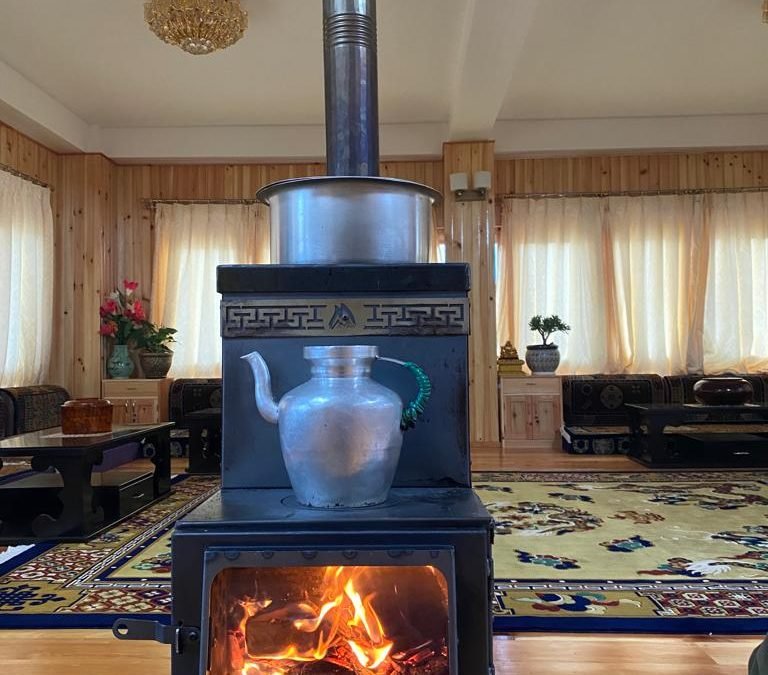At Himalayan, people have an intense desire to use efficient and clean-burning options. Most people ask: can wooden stoves be used indoors for heating?
No, simply, the wooden stoves are not designed for completely indoor usage. Because it generates impressive heat, and family safety is our first concern. Below are some reasons why indoor usage is not recommended for wood stoves:
- Carbon Monoxide (CO) Poisoning: These stoves perform with exceptional fuel combustion efficiency. However, in a confined space, this may encourage poor combustion and carbon monoxide production which is colorless and odorless gas.
- Fire Hazards: Being hot when burning, they can reach high temperatures due to its metal body. Improper location or indoor use poses significant fire danger.
While we understand that people want heaters that can do more than just heat one room at a time, nothing comes before security. Here is why HRS Stoves can be used for indoor heating.
Safe and Effective Alternatives for Indoor Heating:
Keep your home warm and comfortable with these great options:
- Fixed Indoor Heaters: Gas fireplaces, wood stoves, and electric heaters are designed specifically for safe indoor use and offer controlled heating solutions.
- Improved Insulation: Investing in proper insulation for your home can significantly improve heat retention and reduce dependence on space heaters.
The HRS: A Champion for the Indoors
The HRS provides efficient indoor cooking with boiling water facilities. The following are some of its strengths that make it suitable for indoor activities:
- Fuel Efficiency: Saving you money and minimizing environmental impact, the HRS makes good use of your fuel source.
- Design for Portability: Lightweight and small-sized, the HRS is perfect for camping, backpacking or emergency preparedness inside your homes.
- Durability in Construction: The HRS is made to last; hence it can withstand all sorts of weather conditions but inside. So better to use it internally to protect it from water & moisture, which may lead to rust when used in the open.
Stay Warm and Stay Safe
It is an invaluable resource for any enthusiast or someone searching for a clean burning efficient cooking solution. At HRS we strive to provide safe and sustainable options for heating. Check out our website to find out more about how convenient this device can be when used inside!
Frequently Asked Questions
What can I cook with the HRS?
- The HRS is an all-around stove that can serve various purposes such as water boiling, rice and beans cooking, stews making, frying and grilling.
What kind of fuel will be compatible with the HRS?
- The HRS is designed to burn a range of dry, small-diameter biomass fuels like twigs, branches, pine cones and wood chips.
How long does it take for water to boil on the HRS?
- Boiling time depends on pot size, amount of water in the pot and type of fuel used. However, the HRS burns more efficiently than traditional camping stoves and generally boils water more quickly.
How portable is the HRS?
- It’s lightweight and compact for easy transportation during camp, hiking or preparedness while facing emergencies.
How easy is it to use the HRS?
- The stove is relatively simple. Usually little to no setup required and it usually runs off readily available materials.
How do I clean and maintain my stove (HRS)?
- Cleaning this cooker has always been a walk in the park. When cool 100%, simply brush away any ash or debris from around it. The chimney may be removed for thorough washing.
In what way is the HRS dissimilar to a traditional camp stove?
- As opposed to gas canister dependent traditional camp stoves, the HRS offers better fuel economy and is eco-friendly. Moreover, it employs biomass fuels that are easily available thereby doing away with the burdensome task of carrying extra fuel containers.
What are some benefits of using a HRS?
- The HRS has several advantages including:
- Efficient use of energy: Saves money and reduces environmental impact.
- Portability: Can be carried around because it’s light and small.
- Durability: Its long lastingness.
- Fuel flexibility: Uses different types of biomass fuels.


Recent Comments